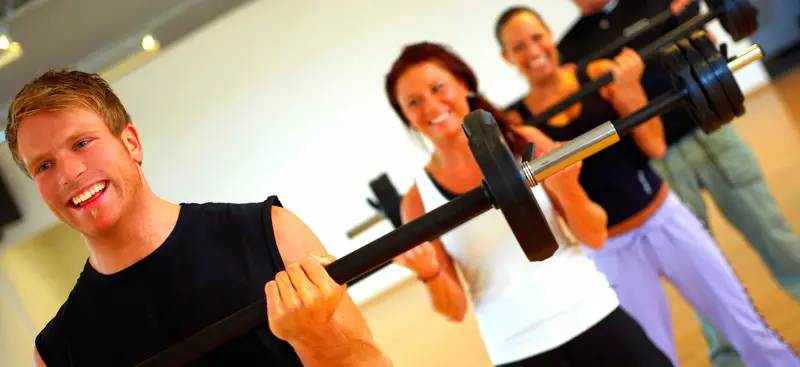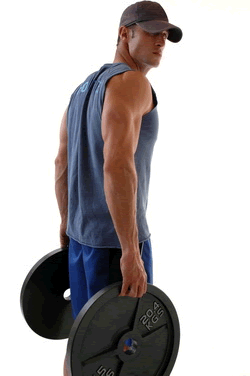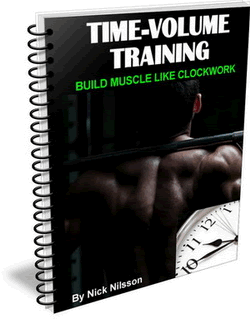Choosing a gym to train at is one of THE most critical decisions you have to make with regards to your training.
Picking the wrong one can lead to frustration and poor results, while picking the RIGHT one can give you tremendous motivation and practically guarantee your success.

So to help you make that decision, I've got a list of factors...some may be pretty straightforward, but some may be really be eye-openers.
1. Location, Location, Location
This is an easy one. If the gym isn't convenient to where you live or work, it makes it that much harder to motivate yourself to go...unless you're already so highly motivated that something like that won't stop you.
If the location is not good then that evil factor "time" will rear its ugly head. Lack of time is the #1 reason people don't train or stop training. Pick a gym that's easy to get to and you'll help yourself tremendously.
That being said, if you find a decent gym to train at some of the time (e.g. weekdays, near work) and have a great gym you can to on the weekend, even if it's further, it'll be worth extra effort (of course, that's where having the money to pay for 2 gym memberships comes into play).
2. Timing is Everything
DO NOT go visit the prospective gym on Saturday morning (which is generally one of the LEAST busy times for gyms) if you're going to train there during the week after work at 5 o'clock.
Visit the gym at the EXACT time you're planning on going to it so you can see how busy it is and to get an idea of the people who train there at that time.
Look closely at the areas of the gym you'll be working in...if the cardio section is packed but the free weight area is empty, then it might not be an issue.
Getting an idea of WHO is training in the gym at the same time may sound snobby but think about it this way...these are the people who you're going to have to deal with (and who are going to have to deal with YOU!) in the gym.
3. Tour the Facility and Take Note of the Equipment
Make sure they have the equipment you want. Any half-decent gym is going to have a free-weight area. The quality and focus of that free-weight area will tell you a LOT about who the gym caters to.

If you like to train heavy but the dumbbells only go up to 50 lbs, that will be a good indication that the gym might not be for you (unless you can be satisfied with heavy barbell training!).
4. Try It Out
Go at your preferred time and get a guest pass so you can try the equipment out. Some gyms look like they have a lot of equipment, but it could be all stuff you aren't going to use anyway.
I've also been to gyms that had a nice selection of free weights but when I trained there, I found the handles of the dumbbells were contoured, which I find absolutely irritating.
Taking the equipment for a test run can save you a LOT of trouble.
5. Get a List of The Rules
I'm not talking about the obvious ones like dropping weights, swearing, etc. I'm talking about the LIFTING rules that are going to affect how you train.
For example, you'll find some gyms actually don't allow deadlifting (watch out for this if the gym is on the second floor or higher of a building). The deadlift is one of THE most productive exercises you can do and any place that bans it isn't (in my opinion) serious about helping you get results.
If you like to use chalk, find out if that is allowed. Chalk can be messy and many gyms don't allow it. Some gyms will give you the boot if you "vocalize" too loud during your training!
6. If You're Going to Work With a Trainer...
Get qualifications and references. I've been to some excellent gyms with trainers who have almost no idea what they're doing. I've seen clients being taught dangerous exercises (behind the neck Smith machine shoulder press) while the trainer runs off to the bathroom or talks on a cell phone.
A trainer should be more than a rep counter or a cheerleader. A good trainer will GUIDE you and TEACH you. In fact, a very good trainer's goal should be to work themselves right out of a job, teaching you so well that you don't even need them anymore!
And even if you don't plan on using a trainer, having a bad one hanging around giving you "pointers" can be incredibly annoying. It's great if they know what they're doing, but it often seems that the ones with the least competence are the ones most vocal about offering advice and criticizing your "bad" form.
7. Cleanliness and Atmosphere
Both of these factors operate on a sliding scale and how much they weigh in with your decision will vary according to all the other factors.
For example, if the place is very clean but the gym equipment isn't the greatest, a spotless place to train may be more important to you. On the flip side, the atmosphere may not be good and it might not be an enjoyable place to train at.
And then you might find a gym that's not particularly clean at all (like a basic warehouse gym) but is frequented by people totally dedicated to training and who constantly encourage and welcome new people in. The atmosphere might totally make up for any lack of polish.
It all comes down to what's most important to you.
8. Membership Dues
This can be a tricky one as some gyms have monthly dues where you're not locked into anything long-term while some gyms have a multi-year plan that you then "finance" by paying monthly on the balance.
It's CRITICAL you know exactly what you're getting into before you sign anything. Be prepared to walk out of the sales office if they don't take the time to explain everything to you, including your options if you move out of the area.
The last time I checked on this, it was the LAW that they have to let you out of the contract if you move more than 25 miles away from that gym or the nearest franchise of that gym. This is normally stated in the terms of your contract but be VERY sure you know your options about cancelling. Some gyms will be nice enough about it but some will dig in their heels.
Make absolutely sure you know if you're on a straight-up monthly plan that you can cancel anytime or if you're on a balloon-payment plan that you're simply making payments on until you pay the whole balance off.
There are also memberships that limit the days you're able to train. For example, Bally's used to have a membership that was only $19.95 a month but you were only allowed to train on Monday, Wednesday and Friday.
Sales people are there to SELL and generally won't hesitate to put pressure on you. If you want to avoid this, the smaller more "mom and pop" gyms will generally be a better bet.
9. Supplement Sales
While there is nothing at all wrong with supplements in general, they're NOT 100% necessary in order for you to get results. You can tell a lot about a gym by how hard they push them when you walk in the door. Supplements can be very profitable and I HIGHLY encourage you to shop around online before buying anything in a gym (or even in a health food store like GNC). You can generally get things way cheaper online.
Check out quality supplements from my partners at JayLabPro...
Check out the best prices on "big brand" supplements from FitRx...
10. The Power Racks
This might be a personal preference, but one of the first things I look for in a gym is the power rack situation. I use the power rack so much that any gym lacking at least one decent rack will not get my vote.
If a gym has more than one good rack, that says a lot about the quality of the free weight area of the facility. One of the best gyms I've trained at was the gym where I went to school - The University of Lethbridge.
They had THREE racks, two Olympic lifting platforms (with bumper plates), dumbbells up to 120 lbs, three flat bench stations, a bunch of adjustable benches that weren't bolted to the floor so you could actually move them around, and plenty of open space. They had a decent selection of basic machines, which were of secondary importance, which is as it should be.
#11 - The FINAL Factor
And yes, I realize this is #11 on a list of 10...
In certain situations, this final factor trumps ALL the other factors.
And that factor is...availability.
In smaller towns, you may have only ONE gym in the whole town, in which case all the other factors I mentioned go out the window. It's then up to you to decide if you're willing to work with the positives and negatives of that one gym or if you want to train at home.
On the plus side, in a smaller gym, you'll potentially have the opportunity to get to know the owner or manager and your suggestions might actually be listened to.
CONCLUSION:
Take as many of these factors into account in your choice gyms as you can. The more you know about the potential place you're going to train, the better off you'll be when it comes to getting the results you want.
If you prefer to train at home, learn what your options are for home gym training here.
![]()
More From Fitstep.com
| How I Gained 25 Pounds in One Week | |
| 5 Fat-Loss Myths That Are KILLING Your Results | |
| 8 Easy Exercises You Can Do At Home | |
| 4 Tips For Larger, Firmer, Rounder Glutes |
Share This Page...
---
Home -> Fitness For Beginners -> Weight Training -> Choose a Gym



